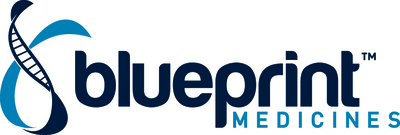Blueprint Medicines Corporation announced data from the registration-enabling NAVIGATOR trial of avapritinib in patients with PDGFRA Exon 18 mutant gastrointestinal stromal tumors and fourth-line GIST.
- 86% ORR and median DOR not reached in PDGFRA Exon 18 mutant GIST
- 22% ORR and 10.2 month median DOR in fourth-line GIST
- On track to submit NDA to FDA in June 2019 and MAA to EMA in third quarter of 2019
CAMBRIDGE, Mass., June 1, 2019 /PRNewswire/ -- Blueprint Medicines Corporation (NASDAQ: BPMC), a precision therapy company focused on genomically defined cancers, rare diseases and cancer immunotherapy, today announced data from the registration-enabling NAVIGATOR trial of avapritinib in patients with PDGFRA Exon 18 mutant gastrointestinal stromal tumors (GIST) and fourth-line GIST. These results were presented at the American Society of Clinical Oncology (ASCO) 2019 Annual Meeting and will form the basis for planned worldwide marketing applications for avapritinib, an investigational, highly selective KIT and PDGFRA inhibitor for patients with advanced GIST. The data demonstrate clinical activity and favorable tolerability in patients with PDGFRA Exon 18 mutant and fourth-line GIST, two populations with no effective therapies.

Data from the ongoing NAVIGATOR trial in patients with PDGFRA Exon 18 mutant GIST, which primarily includes the D842V mutation, and fourth-line GIST support Blueprint Medicines’ plans to submit a New Drug Application (NDA) to the U.S. Food and Drug Administration (FDA) in June 2019 and a Marketing Authorization Application (MAA) to the European Medicines Agency (EMA) in the third quarter of 2019. Avapritinib has received FDA Breakthrough Therapy Designation for the treatment of patients with unresectable or metastatic GIST harboring the PDGFRα D842V mutation.
In patients with PDGFRA Exon 18 mutant GIST, the objective response rate (ORR) was 86 percent and the median duration of response (DOR) was not reached. In patients with fourth-line GIST, the ORR was 22 percent and the median DOR was 10.2 months. ORR and DOR per central radiographic review will be the primary registrational endpoints. Avapritinib was well-tolerated with most adverse events (AEs) reported by investigators as Grade 1 or 2. These results were as of a data cutoff date of November 16, 2018.
“These data highlight the potential of avapritinib to shift the treatment paradigm for GIST toward a precision medicine approach based on the genomic driver of disease,” said Michael Heinrich, M.D., Professor of Medicine at Oregon Health & Science University and an investigator on the NAVIGATOR trial. “In the PDGFRα D842V population where we currently have no effective agents, avapritinib demonstrated remarkable activity regardless of line of therapy. I believe these results will further catalyze the use of mutational testing in GIST patients prior to starting therapy, which is currently recommended by treatment guidelines. Importantly, avapritinib has also demonstrated the potential to suppress complex and heterogenous mutational profiles associated with treatment-resistant fourth-line GIST. Combined with the well-tolerated safety profile of avapritinib, I believe these data show the broad potential of avapritinib to advance care across the GIST treatment landscape.”
“These results further demonstrate the activity and favorable tolerability of avapritinib, a potent and highly selective PDGFRA and KIT inhibitor, in two patient populations with tumor mutations resistant to currently available therapies,” said Andy Boral, M.D., Ph.D., Chief Medical Officer at Blueprint Medicines. “Based on the strength of these data and the clear medical needs in PDGFRA Exon 18 mutant and fourth-line GIST, we look forward to working closely with global regulatory authorities to bring this important advance in treatment to patients as expeditiously as possible. In addition, the previously reported preliminary data in third-line and second-line GIST support our broad clinical development program and highlight the potential of avapritinib to become a foundational GIST treatment.”
Highlights from ASCO Presentation of NAVIGATOR Trial Data
As of the data cutoff date of November 16, 2018, 204 patients were treated with avapritinib at a starting dose of 300 or 400 mg once daily (QD). Patients with PDGFRA Exon 18 mutant GIST were treated across all lines of therapy. Patients with fourth-line or later GIST had a median of four prior lines of therapy (ranging from three to 11) prior to receiving avapritinib.
Clinical Activity Data
As of the data cutoff date, 43 patients with PDGFRA Exon 18 mutant GIST (including 38 patients with PDGFRα D842V-driven GIST) and 111 patients with fourth-line GIST were treated at a starting dose of 300 or 400 mg QD and evaluable for response assessments. Patients were evaluable if they had at least one centrally reviewed radiographic scan, and data are based on modified Response Evaluation Criteria in Solid Tumors version 1.1 (mRECIST 1.1 criteria) for GIST.
In evaluable patients with PDGFRA Exon 18 mutant GIST:
- The ORR was 86 percent, with three confirmed complete responses (CR) and 34 partial responses (PR; one pending confirmation1).
- The ORR was 100 percent (two CRs and three PRs; all responses were confirmed) in the first-line treatment setting.
- The median DOR was not reached.
- 28 patients (78 percent) remained in response as of the data cutoff date.
- Median follow-up was 10.9 months.
In evaluable patients with fourth-line GIST:
- The ORR was 22 percent, with one confirmed CR and 23 PRs (one pending confirmation1).
- The median DOR was 10.2 months.
- Median follow-up was 10.8 months.
Safety Data
Avapritinib had a favorable safety profile in patients treated at a starting dose of 300 or 400 mg QD, with most AEs determined by investigators to be Grade 1 or 2 as of the data cutoff date. Across all patients, 8 percent of patients discontinued treatment with avapritinib due to treatment-related AEs. A lower incidence of commonly reported AEs was reported at 300 mg QD dosing compared to 400 mg QD dosing.
Across all grades, the most common treatment-emergent AEs (regardless of relationship to avapritinib) reported by investigators (≥25 percent) were nausea, fatigue, anemia, cognitive effects, periorbital edema, vomiting, decreased appetite, diarrhea, increased lacrimation and peripheral edema. Investigator-reported Grade 3 or 4 treatment-related AEs (≥2 percent) included anemia, fatigue, cognitive effects, increased blood bilirubin, diarrhea, hypophosphatemia, decreased neutrophil count, neutropenia and lymphopenia.
These data on avapritinib were presented at the ASCO 2019 Annual Meeting in a poster presentation on Saturday, June 1 (Abstract Number: 11022). A copy of the poster is available in the “Science—Publications and Presentations” section of Blueprint Medicines’ website at www.BlueprintMedicines.com.
About the Avapritinib Clinical Development Program in GIST
Blueprint Medicines is pursuing a broad clinical development program for avapritinib across all lines of GIST. Avapritinib is currently being evaluated in two global registration-enabling clinical trials for GIST: the Phase 1 NAVIGATOR trial and the Phase 3 VOYAGER trial.
The NAVIGATOR trial is designed to evaluate the safety, tolerability and clinical activity of avapritinib in patients with unresectable or metastatic GIST. The trial consists of two parts, a dose escalation portion and an expansion portion. Trial objectives include assessing response using blinded central radiology review, as well as pharmacokinetics and pharmacodynamic measures. The expansion cohorts of the trial enrolled patients at multiple sites in the United States, European Union and Asia.
The VOYAGER trial is a global, open-label, randomized, Phase 3 trial designed to evaluate the safety and efficacy of avapritinib versus regorafenib in patients with third- or fourth-line GIST. The trial is designed to enroll approximately 460 patients randomized 1:1 to receive either avapritinib or regorafenib at multiple sites in the United States, Canada, European Union, Australia and Asia.
In the second half of 2019, Blueprint Medicines plans to initiate COMPASS-2L, a global, randomized, Phase 3 precision medicine trial. The trial will evaluate the safety and efficacy of avapritinib versus sunitinib in second-line GIST patients with pre-specified disease genotypes.
Patients and physicians interested in the Phase 3 VOYAGER trial can contact the Blueprint Medicines study director at VOYAGER@blueprintmedicines.com or 1-617-714-6707. For more information about the VOYAGER trial, please visit www.BlueprintClinicalTrials.com/VOYAGER. Additional details are available on www.clinicaltrials.gov (ClinicalTrials.gov Identifier: NCT03465722).
About GIST
GIST is a sarcoma, or tumor of bone or connective tissue, of the gastrointestinal (GI) tract. Tumors arise from cells in the wall of the GI tract and occur most often in the stomach or small intestine. Most patients are diagnosed between the ages of 50 to 80, and diagnosis is typically triggered by GI bleeding, incidental findings during surgery or imaging and, in rare cases, tumor rupture or GI obstruction.
Most GIST cases are caused by a spectrum of clinically relevant mutations that force the KIT or PDGFRA protein kinases into an increasingly active state. Because currently available therapies primarily bind to the inactive protein conformations, certain primary and secondary mutations typically lead to treatment resistance and disease progression.
Treatment options for KIT-driven GIST patients who progress beyond imatinib are currently limited. There are no effective treatment options for patients with metastatic PDGFRα D842V-driven GIST, and progression occurs in a median of approximately three to four months with available therapy. In unresectable or metastatic GIST, clinical benefits from existing treatments can vary by mutation type. Mutational testing is critical to tailor therapy to the underlying disease driver and is recommended in expert guidelines.
About Avapritinib
Avapritinib is an investigational, oral precision therapy that selectively and potently inhibits KIT and PDGFRA mutant kinases. It is a type 1 inhibitor designed to target the active kinase conformation; all oncogenic kinases signal via this conformation. Avapritinib has demonstrated broad inhibition of KIT and PDGFRA mutations associated with GIST, including potent activity against activation loop mutations that are associated with resistance to currently approved therapies. In contrast to approved multi-kinase inhibitors, avapritinib has shown marked selectivity for KIT and PDGFRA over other kinases. In addition, avapritinib is uniquely designed to selectively bind and inhibit D816V mutant KIT, the common driver of disease in approximately 95 percent of all systemic mastocytosis (SM) patients. Preclinical studies have shown avapritinib potently inhibited KIT D816V at sub-nanomolar potencies with minimal off-target activity.
Blueprint Medicines is initially developing avapritinib for the treatment of advanced GIST, advanced SM, and indolent and smoldering SM. The FDA has granted avapritinib two Breakthrough Therapy Designations, one for the treatment of unresectable or metastatic GIST harboring the PDGFRα D842V mutation and one for the treatment of advanced SM, including the subtypes of aggressive SM, SM with an associated hematologic neoplasm and mast cell leukemia.
Blueprint Medicines has an exclusive collaboration and license agreement with CStone Pharmaceuticals for the development and commercialization of avapritinib and certain other drug candidates in Mainland China, Hong Kong, Macau and Taiwan. Blueprint Medicines retains development and commercial rights for avapritinib in the rest of the world.
About Blueprint Medicines
Blueprint Medicines is a precision therapy company striving to improve human health. With a focus on genomically defined cancers, rare diseases and cancer immunotherapy, we are developing transformational medicines rooted in our leading expertise in protein kinases, which are proven drivers of disease. Our uniquely targeted, scalable approach empowers the rapid design and development of new treatments and increases the likelihood of clinical success. We are currently advancing four investigational medicines in clinical development, along with multiple research programs. For more information, visit www.BlueprintMedicines.com and follow us on Twitter (@BlueprintMeds) and LinkedIn.
Cautionary Note Regarding Forward-Looking Statements
This press release contains forward-looking statements within the meaning of the Private Securities Litigation Reform Act of 1995, as amended, including, without limitation, statements regarding plans and timelines for the clinical development of avapritinib; expectations regarding the potential benefits of avapritinib in treating patients with GIST; plans and timelines for submitting an NDA to the FDA for avapritinib for the treatment of PDGFRA Exon 18 mutant GIST and fourth-line GIST; plans and timelines for submitting an MAA to the EMA for avapritinib for the treatment of PDGFRα D842V mutant GIST and fourth-line GIST; expectations regarding clinical data for avapritinib in third-line and second-line GIST; plans, timelines and expectations for interactions with global regulatory authorities; and Blueprint Medicines’ strategy, goals and anticipated milestones, business plans and focus. The words “may,” “will,” “could,” “would,” “should,” “expect,” “plan,” “anticipate,” “intend,” “believe,” “estimate,” “predict,” “project,” “potential,” “continue,” “target” and similar expressions are intended to identify forward-looking statements, although not all forward-looking statements contain these identifying words. Any forward-looking statements in this press release are based on management’s current expectations and beliefs and are subject to a number of risks, uncertainties and important factors that may cause actual events or results to differ materially from those expressed or implied by any forward-looking statements contained in this press release, including, without limitation, risks and uncertainties related to the delay of any current or planned clinical trials or the development of Blueprint Medicines’ drug candidates, including avapritinib, BLU-667, BLU-554 and BLU-782; Blueprint Medicines’ advancement of multiple early-stage efforts; Blueprint Medicines’ ability to successfully demonstrate the safety and efficacy of its drug candidates and gain approval of its drug candidates on a timely basis, if at all; the preclinical and clinical results for Blueprint Medicines’ drug candidates, which may not support further development of such drug candidates; actions of regulatory agencies, which may affect the initiation, timing and progress of clinical trials; Blueprint Medicines’ ability to develop and commercialize companion diagnostic tests for its current and future drug candidates; and the success of Blueprint Medicines’ current and future collaborations, including its cancer immunotherapy collaboration with F. Hoffmann-La Roche Ltd and Hoffmann-La Roche Inc. and its collaboration with CStone Pharmaceuticals. These and other risks and uncertainties are described in greater detail in the section entitled “Risk Factors” in Blueprint Medicines’ Quarterly Report on Form 10-Q for the period ended March 31, 2019, as filed with the Securities and Exchange Commission (SEC) on May 9, 2019, and any other filings that Blueprint Medicines has made or may make with the SEC in the future. Any forward-looking statements contained in this press release represent Blueprint Medicines’ views only as of the date hereof and should not be relied upon as representing its views as of any subsequent date. Except as required by law, Blueprint Medicines explicitly disclaims any obligation to update any forward-looking statements.
1 This PR has since been confirmed after the data cutoff date.
![]() View original content to download multimedia:http://www.prnewswire.com/news-releases/blueprint-medicines-presents-navigator-trial-data-in-pdgfra-exon-18-mutant-gist-and-fourth-line-gist-at-asco-2019-supporting-planned-marketing-applications-for-avapritinib-300860123.html
View original content to download multimedia:http://www.prnewswire.com/news-releases/blueprint-medicines-presents-navigator-trial-data-in-pdgfra-exon-18-mutant-gist-and-fourth-line-gist-at-asco-2019-supporting-planned-marketing-applications-for-avapritinib-300860123.html
SOURCE Blueprint Medicines Corporation
Company Codes: NASDAQ-NMS:BPMC




